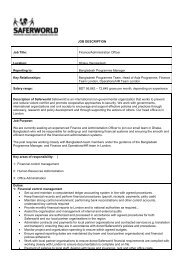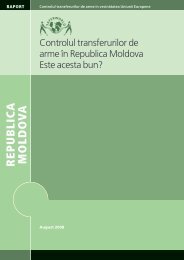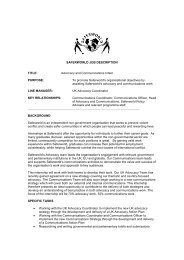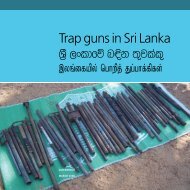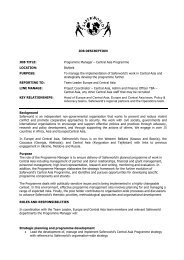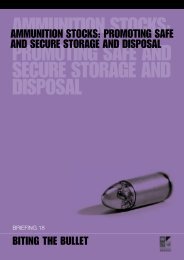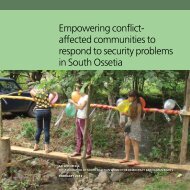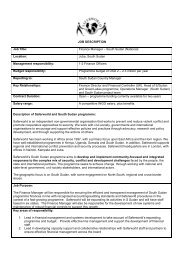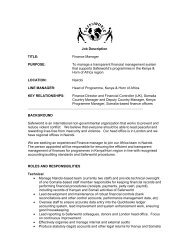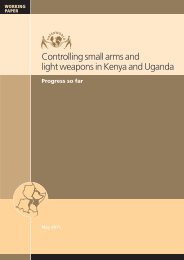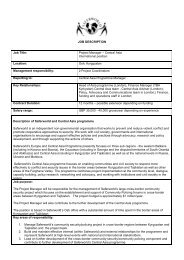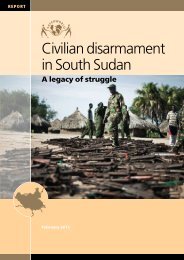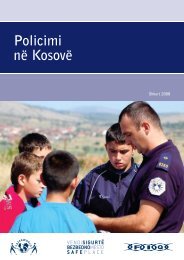Moldova And International Small Arms Transfers - Saferworld
Moldova And International Small Arms Transfers - Saferworld
Moldova And International Small Arms Transfers - Saferworld
- No tags were found...
Create successful ePaper yourself
Turn your PDF publications into a flip-book with our unique Google optimized e-Paper software.
eport<strong>Moldova</strong> and internationalsmall arms transfers:Implementing UN Programme of Action commitmentsJuly 2008
<strong>Moldova</strong> and internationalsmall arms transfers:Implementing UN Programme of Action commitmentsSAFERWORLDJULY 2008
ContentsExecutive summaryi1. Introduction 12. <strong>Moldova</strong> and the trade in SALW 33. Licensing/authorisation of SALW transfers 54. End-use certification and verification 95. Record keeping 106. Pre-notification of transfer 117. Border controls 128. Criminalisation 149. Stockpiles and surplus 1510. Interdepartmental relationships and co-operation 1711. Information-sharing and co-operation with external actors 1912. Oversight (transparency and accountability) 2113. Corruption 2314. Capacity 2415. Conclusions and recommendations 25Annex 1: Methodology 29© <strong>Saferworld</strong>, July 2008. All rights reserved. No part of this publication may bereproduced, stored in a retrieval system or transmitted in any form or by any meanselectronic, mechanical, photocopying, recording or otherwise, without fullattribution. <strong>Saferworld</strong> welcomes and encourages the utilisation and disseminationof the material included in this publication.
Executive summaryTHE PURPOSE OF THIS REPORT is to evaluate <strong>Moldova</strong>’s performance inimplementing UN Programme of Action to Prevent, Combat and Eradicate the IllicitTrade in <strong>Small</strong> <strong>Arms</strong> and Light Weapons in All Its Aspects (UN PoA) commitments asthey apply to international transfers of small arms and light weapons (SALW).No analysis is made of UN PoA implementation in the breakaway Transdniestrianregion, on the grounds that it would be unreasonable to assess <strong>Moldova</strong>’s performancewith regard to territories over which the <strong>Moldova</strong>n Government does not holdeffective control. Analysis is therefore confined to that part of <strong>Moldova</strong> over which therecognised government wields undisputed political control.Since independence <strong>Moldova</strong> has had virtually no SALW production capacity, yetuntil recently it had a reputation both as an irresponsible exporter and as a base for theillicit transportation of SALW. However, practice over the last few years appears tohave improved; <strong>Moldova</strong>’s engagement in any kind of imports or exports of SALW hasbecome relatively insignificant.Nevertheless, it is understood that <strong>Moldova</strong> retains significant SALW stockpiles andwould welcome the opportunity to sell at least some of them on the internationalmarket. Furthermore, current <strong>Moldova</strong>n involvement in the brokering and transportationof SALW is unclear, and, according to various UN reports, some <strong>Moldova</strong>ntransportation companies have a history of being involved in arms transfers in breachof UN arms embargoes.Licensing/authorisation of SALW transfers<strong>Moldova</strong> has a relatively well-developed legal framework for controlling exports,imports, transit and retransfer of SALW, with all such transfers requiring governmentapproval. Under <strong>Moldova</strong>n law, those intending to engage in the international transferof ‘strategic’ SALW must first apply for a licence, with ‘authorisations’ then requiredfor each individual transfer. A division within the Ministry of Economy administersthis system and makes a recommendation to an Interdepartmental ControlCommission (ICC), which is then responsible for issuing or refusing the authorisation.In addition, individual small arms for civilian use can be imported or exported by fourstate-owned and run ‘Specialised Weapons Stores’, with authorisations granted (orrefused) by the Ministry of the Interior (MOI). There is, however, some confusion overwhere responsibility lies for transfers of small arms with a calibre of less than 12.7mm.
iiMOLDOVA AND INTERNATIONAL SMALL ARMS TRANSFERSIn order to authorise a ‘strategic’ SALW transfer, the government is obliged to receivevarious documentary evidence and to take into account <strong>Moldova</strong>’s foreign policy andnational security interests, and international commitments (including UN resolutions).This appears to fall some way short of meeting <strong>Moldova</strong>’s existing responsibilitiesunder international law, as demanded in the UN PoA. For example, only the Ministryof Foreign Affairs (MFA) indicated a real appreciation of human rights and internationalhumanitarian law in this context. Unfortunately, the opinion of the MFA caneasily be ignored, as decisions are taken on the basis of majority voting where as few ashalf the ICC members need be present to constitute a quorum. There are apparentlyno formally established criteria for transfer decisions regarding civilian-use smallarms.<strong>Moldova</strong>n law does not effectively control third-country arms brokering, and thereappears to be no effective control over arms transportation activities of <strong>Moldova</strong>nnationals or of companies registered as <strong>Moldova</strong>n.On several occasions during this evaluation the point was made that regulating SALWtransfers was simply not a priority for most officials.End-use certification and verificationSome form of end-use certification (EUC) is required for all imports and exports ofstrategic SALW with a ‘military’ or ‘half-military’ purpose. i In theory, the Ministry ofEconomy (MOE) is responsible for verifying the authenticity of EUCs, however it isnot clear how often this actually takes place, or how such checks are conducted.Record-keepingBoth the MOI and <strong>Moldova</strong>n companies are required to keep records on types andquantities of SALW transferred and the identities of their counterparties of all transactionsfor 10 years. Companies transferring arms are subject to audits at least once ayear, though the extent to which this happens in practice is not clear.Pre-notification of retransfer<strong>Moldova</strong> places a contractual obligation on the recipients to which it transfers SALWnot to re-export without permission, though there was little sign of procedures inplace to check on end-use. The <strong>Moldova</strong>n Government is also legally obligated to useimported strategic SALW only for the purposes declared in advance of their transfer,and to ensure that no re-export takes place from <strong>Moldova</strong> without the explicitapproval of the original exporting state. But again no evidence was provided as towhether such procedures are always followed.Border controlsBorder security, which is managed by the Customs Service and the Border GuardService (BGS), is politically sensitive due to the dispute between <strong>Moldova</strong> and theseparatist Transdniestrian region. The EU Border Assistance Mission (EUBAM),established in 2005 with a monitoring and advisory role on both sides of the <strong>Moldova</strong>-Ukraine border, has found little evidence of large-scale SALW trafficking, and SALWcontrol is not a priority for the Mission. There is a general feeling that the legislationgoverning border control in <strong>Moldova</strong> is in need of comprehensive review to bring itinto line with international best practice. Moreover, it is widely acknowledged that therelationship between Customs and BGS has been problematic in the past, though thereare different views on whether these difficulties have been resolved. Border control ini ‘Government Decision No. 606’, Appendix 2, Article 4. Unfortunately, the terms ‘military’ and ‘half-military’ are not definedin the legislation, and there seems to be confusion within the government as to how they should be interpreted.
SAFERWORLDiiigeneral is under-resourced, with a lack of physical infrastructure and low salaries forstaff (corruption was identified as endemic in this area).Criminalisation<strong>Moldova</strong>n arms transfer control law states that “violations of the regulations … shallentail the civil and criminal liabilities prescribed under prevailing law”. All breaches ofarms transfer control laws are therefore apparently subject to penal and civil codes,however transfer control laws should be amended to detail the range and maximumextent of civil and criminal punishments for relevant offences.Stockpiles and surplus<strong>Moldova</strong> has so far not publicly declared what it regards as surplus SALW. Largestockpiles were left over from when <strong>Moldova</strong> was part of the Soviet Union, and while itseems these stockpiles have been substantially run down, according to the Ministry ofDefence (MOD) there are still huge amounts of obsolete weapons and munitions. The<strong>Moldova</strong>n Government seems happy to destroy excess SALW and ammunition whereit is dangerous or obsolete, or where the prospects of sale are minimal, but is willing tolook at selling surplus where it calculates a buyer might be found. Management ofstockpiles has by all accounts improved in recent years, but there is still more thatcould be done. For example, the MOD has identified a need to do more to protect thearea around the stockpiles, and not just the stockpiles themselves.Interdepartmental relationships and co-operationThe SALW transfer licensing process is apparently currently tainted by interdepartmentalrivalries and a lack of co-operation. This situation needs to be addressed and<strong>Moldova</strong> is in the process of setting up a National Commission Monitoring <strong>Arms</strong>Control and Development, which will include a working group on SALW. Withappropriate political direction and support this new Commission could help to resolvethese traditional tensions. However, there is also a danger that this could make thingsworse by simply creating yet another competing agency.Information-sharing and co-operation with external actors<strong>Moldova</strong> generally files reports on arms transfer issues as required by relevant multilateralinstitutions, e.g. on UN PoA implementation, to the OSCE (Organisation forSecurity and Co-operation in Europe as required by the OSCE Document on SALW,and to the UN Register of Conventional <strong>Arms</strong>. <strong>Moldova</strong> has also proved supportive ofother measures to better regulate arms transfers, e.g. by supporting moves at the UNin favour of an international <strong>Arms</strong> Trade Treaty.Oversight (transparency and accountability)<strong>Moldova</strong> does not provide public or parliamentary reports on its internationalSALW transfers, and there is little interest among the relevant officials to change this.State secrecy laws are vague and broadly drawn and seem to validate non-disclosure.Nevertheless, MOI officials indicated that they would be willing to publish a nationalreport showing types, quantities and end-users of all imports, exports and transits ofSALW, but only if they were so instructed by their political masters. However,Members of Parliament (MPs), broader civil society and the population as a wholedemonstrate little day-to-day interest in SALW transfer issues. This lack of transparencyand interest is worrying, not least given that several respondents identifiedcorruption in connection with international SALW transfers as a problem.
ivMOLDOVA AND INTERNATIONAL SMALL ARMS TRANSFERSCapacityThere is a need to improve staffing levels and expertise across most elements of theSALW transfer control regime, e.g. the transfer authorisation process, end-usecertification checks and end-use monitoring, stockpile management, surplusdestruction and border control. This is complicated, however, by the fact that <strong>Moldova</strong>is now involved in relatively few SALW transfers, and for most officials involved this isonly a small part of their job. There is also a need to develop the use of informationtechnologies and physical infrastructure.Conclusions and recommendationsThe report concludes with a relatively small number of key recommendations that, ifadopted, could produce a significant improvement in <strong>Moldova</strong>n practice. Theseinclude the need to:■ introduce certain changes to transfer control legislation;■ amend the decision-making process for individual transfers;■ improve end-use certification procedures;■ publicly identify and commit to destroy surplus SALW;■ update border control legislation and increase the resources devoted to it;■ improve transparency and accountability; and■ increase capacity and expertise of relevant officials.
1IntroductionSINCE THE UN SALW Programme of Action to Prevent, Combat and Eradicate theIllicit Trade in <strong>Small</strong> <strong>Arms</strong> and Light Weapons in All Its Aspects (UN PoA) was agreedin 2001, there has been progress towards its implementation in a number of countriesaround the world. This progress has been less pronounced than many had hoped;nevertheless the UN PoA remains the most important and comprehensive internationalframework for addressing small arms and light weapons (SALW) control‘in all its aspects’.Evidence suggests that in many cases, progress has been slow even in countries wherethere is political will to work towards implementation and in which there is at leastsome capacity in relevant departments and ministries. A primary reason for this maybe the lack of knowledge and capacity for translating rhetorical political commitmentinto practical action. In the absence of such knowledge, states have not been able toeffectively identify or communicate their needs, with the consequence that internationalco-operation and assistance has not been forthcoming.This report seeks to address the situation in <strong>Moldova</strong>. It examines the extent to which<strong>Moldova</strong> is meeting its UN PoA commitments to strengthen controls on the internationaltransfer of SALW and identifies priorities for future action by both <strong>Moldova</strong>nofficials and the international donor community. The assessment is designed to:■ alert key actors within <strong>Moldova</strong> to their UN PoA transfer control commitments;■ establish where the gaps in UN PoA implementation lie;■ chart a ‘roadmap’ for addressing those gaps; and■ begin to build the necessary constituency committed to honouring those obligations.This report, focusing on <strong>Moldova</strong>, forms part of a broader international programmeof work designed to improve implementation of PoA commitments on internationalSALW transfers.The report does not examine the situation in the breakaway Transdniestrian region. Asthe purpose of this report is to evaluate <strong>Moldova</strong>’s performance in implementing UNPoA commitments, it would be unreasonable to assess this with regard to territoriesover which the <strong>Moldova</strong>n Government does not hold effective sway. Analysis is thereforeconfined to that part of <strong>Moldova</strong> over which the recognised government of<strong>Moldova</strong> wields undisputed political control. It should be noted, however, that bothsides in the Transdniestrian dispute have sought to gain political advantage out ofclaims that the other is involved in illicit arms transfers. These claims should be
2 MOLDOVA AND INTERNATIONAL SMALL ARMS TRANSFERSconsidered very carefully; the partial evidence available suggests that, recently at least,the situation on both sides may be less problematic than the competing rhetoric wouldsuggest.In the 1990s and early 2000s <strong>Moldova</strong>, while having no SALW production capacity,had a reputation as both an irresponsible exporter of Soviet-era surpluses and a basefor illicit transportation of SALW. However, over the last few years <strong>Moldova</strong>’s profilein this area has undergone significant change; it would seem <strong>Moldova</strong>’s involvement inillicit or ‘grey’ SALW transfers is now much reduced. In part this may be due to the factthat most of <strong>Moldova</strong>’s marketable stockpiles have already been sold, but in additionthere are clear signs that <strong>Moldova</strong> is now taking its SALW transfer responsibilitiesmore seriously. Key legislation for controlling transfers of military and dual-useequipment, including SALW, was passed in 2000 and 2002. <strong>Moldova</strong> now has areasonably sophisticated legal framework providing for many of the elements calledfor in the UN PoA, and appears for the most part capable of exerting its will overSALW transfers. Moreover, indications are that the <strong>Moldova</strong>n Government hasrecently authorised relatively few international transfers of SALW.Nevertheless, there are several aspects of <strong>Moldova</strong>’s SALW transfer control regime thatrequire further attention. These include, for example, the current scope of <strong>Moldova</strong>nlegislation, the decision-making process for individual transfers, disposal of surplus,capacity of officials, and transparency and accountability.While this report is intended as a comprehensive assessment of <strong>Moldova</strong>’s implementationof its SALW transfer control commitments, in the interests of efficiency itsrecommendations focus on the key next steps that would enable <strong>Moldova</strong> to quicklymove to a situation whereby its international commitments are substantially met.This approach is particularly apposite in <strong>Moldova</strong> because when placed alongsidesome of the other challenges the country is facing, it may be argued that the issue ofinternational SALW transfers is of relatively little importance. <strong>Moldova</strong> is thereforeencouraged, in co-operation with the international community, to adopt therecommendations contained herein as a relatively low-cost way to make a significantdifference to the quality of its compliance with the UN PoA.
2<strong>Moldova</strong> andthe trade in SALWSINCE INDEPENDENCE <strong>Moldova</strong> has not had a SALW production capacity (asidefrom some small-scale, state-controlled production of SALW components andammunition, e.g. of cartridges for smooth-bore weapons for use by hunters).<strong>And</strong> despite a stated intention to develop an indigenous defence industry (as outlinedin the 2002 Concept of Military Reform), there are no plans or indications that thiswill include SALW. Nevertheless, until recently <strong>Moldova</strong> had a reputation both as anirresponsible exporter and as a base for illicit transportation of SALW.However, there would seem to have been a significant change in the extent of<strong>Moldova</strong>’s involvement in illicit or ‘grey’ transfers of SALW in the last five or so years.Indeed, <strong>Moldova</strong>’s engagement in any kind of import or export of SALW would seemto have become relatively insignificant.Officials report that no authorisations have been granted for the export of militarySALW for the last few years. In 2007, according to figures from the Ministry ofEconomics, of 47 authorisations issued for transfers of military and dual-use items(24 export; 23 import), only one or two were for military SALW (for imports by thePenitentiary Department of the Ministry of Justice). According to COMTRADE data,<strong>Moldova</strong> imported “pistols, hunting rifles, ammunition and parts and accessories”worth US$ 167,135 in 2005 and US$376,652 in 2006. 1 The <strong>Moldova</strong>n Customs Servicereported that in 2007 a total of 3,233 firearms were imported and just eight (trainingpistols) exported.Although it is difficult to obtain exact figures, there is a general understanding that<strong>Moldova</strong> retains significant SALW stockpiles and would welcome an opportunity tosell at least some of them on the international market. There is therefore no guaranteethat the recent pattern of minimal transfers will continue.Furthermore, the current situation with regard to <strong>Moldova</strong>n involvement in thebrokering and transportation of SALW is unclear, not least because <strong>Moldova</strong> does noteffectively regulate the involvement of <strong>Moldova</strong>n or <strong>Moldova</strong>n-registered actors in1 These COMTRADE figures were accessed through the Norwegian Initiative on <strong>Small</strong> <strong>Arms</strong> <strong>Transfers</strong> (NISAT) Database,. COMTRADE is the UN Commodity Trade Statistics Database.COMTRADE figures are not yet available for 2007.
4 MOLDOVA AND INTERNATIONAL SMALL ARMS TRANSFERSsuch activities. Information is patchy, but a number of transportation companiesregistered in <strong>Moldova</strong> – such as Aerocom, Renan Air and Tiramavia – were allegedlyinvolved in transfers to countries under UN embargo (e.g. Angola, Liberia and SierraLeone) around the turn of the century. 2More recently, in 2004, Aerocom was implicated in the controversial supply of morethan 200,000 surplus AK-47s from Bosnia to Iraq for use by the Iraqi security forces(there is, however, no record of the relevant Aerocom flights landing in Iraq), despitethe fact that Aerocom’s air operating certificate had earlier been revoked by <strong>Moldova</strong>nauthorities. 3 Aerocom is reportedly now defunct, but its assets and aircraft were itseems transferred to another <strong>Moldova</strong>n firm, Jet Line <strong>International</strong>, 4 whose airoperating certificate was in turn revoked in June 2007, along with six other <strong>Moldova</strong>nair operators. 5In November 2005, the UN Security Council Committee established pursuant toresolution 1521 (2003) concerning Liberia, added Moldtransavia, another <strong>Moldova</strong>nair operator, to the list of individuals and entities subject to the measures imposed byparagraph 1 of resolution 1532 (2004) (the Assets Freeze List). According to a 2005 UNpress release, the company was indirectly controlled by, and had participated in, illicitarms deals for Viktor Bout (recently arrested in Thailand for conspiring to transferarms to the FARC in Colombia and widely regarded as among the world’s mostnotorious arms brokers). 62 UN Report on Sierra Leone, S/2001/1015, 26 October 2001; Report S/2001/1015 on the Panel of Experts pursuant toSecurity Council resolution 1343 (2001), paragraph 19, concerning Liberia; UN Security Council, 18 April 2001, addendumto the final report of the Monitoring Mechanism on Sanctions against UNITA (S/2000/1225, annex), submitted in accordancewith Security Council resolution 1336 (2001) of 23 January 2001.3 Amnesty <strong>International</strong>, Dead on Time – arms transportation, brokering and the threat to human rights, May 2006,.4 David Isenberg, ‘Shady dealers aim to arm Iraq’, Asia Times Online, 27 July 2006,.5 Press release of the Civil Aviation Authority of the Republic of <strong>Moldova</strong>, 22 June 2007,. Note that these revocations were then subject tolegal challenge (see release of the Civil Aviation Authority of the Republic of <strong>Moldova</strong>, 13 November 2007,.6 Security Council Committee on Liberia updates asset freeze list, UN Press Release, 30 November 2005,.
3Licensing/authorisationof SALW transfersUNDER THE UN POA, <strong>Moldova</strong> is committed to have in place adequate and transparentlaws, regulations and administrative procedures to exercise effective controlover the export, import, transit, retransfer and brokering of SALW (Section II, paras 2,11, 12 and 14). All international transfers should be licensed, with all decisions requiredto be consistent with states’ existing responsibilities under international law (SectionII, para 11).<strong>Moldova</strong> does have a relatively well-developed legal framework for controllingexports, imports, transit and retransfer of SALW, and all transfers of these typesrequire government approval. However, the system is complicated in that it is dividedinto two distinct regimes:■ <strong>Transfers</strong> of all items in the Control List of Strategic Goods, which includes SALW, areregulated by the 2000 Law on the Control of Export, Re-export, Import and Transit ofStrategic Goods (2000 Law) and the 2002 Government Decision No 606 About theNational System of Export, Re-export, Import and Transit Control of Strategic Goods inthe Republic of <strong>Moldova</strong>; and■ <strong>Transfers</strong> of individual small arms for civilian use are regulated by the 1994 Law onIndividual <strong>Arms</strong> (1994 Law).Under the 2000 Law, companies intending to engage in the international transfer ofSALW classed as ‘strategic’ (i.e. included on the Control List of Strategic Goods,annexed to the 2000 Law) must first apply for a licence. Authorisations are thenrequired for each individual transfer. The Division for Dual-Use Goods TradeControl (Division) within the Ministry of Economy administers applications forauthorisations of individual transfers. The Division makes a recommendation to theInterdepartmental Control Commission (ICC), which is then responsible for issuingor refusing the authorisation. The ICC comprises representatives from the Ministriesof Defence (MOD), Economy (MOE), Foreign Affairs (MFA) and the Interior (MOI),and the Customs Service and the Information and Security Service. Where the
6 MOLDOVA AND INTERNATIONAL SMALL ARMS TRANSFERSstrategic items for sale are from <strong>Moldova</strong>n state inventories (e.g. MOD stocks), theexplicit approval of parliament is also required.The 1994 Law stipulates that only four state-owned and run ‘Specialised WeaponsStores’ are permitted to import or export individual small arms for civilian use, withauthorisations granted (or refused) by the MOI. However previous research carriedout by <strong>Saferworld</strong> revealed that at least 15 other <strong>Moldova</strong>n entities imported SALW ortheir ammunition or components during the period 2001–05. 7<strong>Moldova</strong>n arms export control system: decision-making process and structureTransfer of individualsmall arms for civilian useTransfer of strategic items(including ‘military’ SALW)Four state-owned‘Specialised Weapons Stores’(Gun Shops)Producer/traderApply for authorisation forimport/exportApply for licence toengage in internationaltransfer of ‘strategic’ ëstr itemsApply for authorisationfor individual transfersMinistry of InteriorDivision for Dual-Use Goods Trade Control(Division), Ministry of EconomyDecisionRecommendationInterdepartmentalControl Commission (ICC)• Ministry of Defence• Ministry of Economy• Ministry of Foreign Affairs• Ministry of Interior• Customs Service• Information and SecurityServiceDecision 8Approval/refusal (givingParliament an effective rightof veto in these cases)Parliament(only in cases whereitems are from Ministryof Defence stocks)The two systems do not mesh perfectly. There is apparently confusion over which ofthe two control regimes is responsible for the transfer of small arms with a calibre ofless than 12.7mm. The Control List of Strategic Goods includes weapons of a smallercalibre (excepting smoothbore hunting rifles). However, MOI officials claimed to have7 David Wood, SALW Survey of <strong>Moldova</strong>, <strong>Saferworld</strong>-SEESAC, 2006, pp. 32–33,.8 Note that a decision is taken by majority vote; the ICC requires 50 per cent or more attendance to be quorate.
SAFERWORLD 7responsibility for non-military small arms with calibre less than 12.7mm or alternativelyall small arms with calibre less than 12.7mm.In order to receive an authorisation, a prospective buyer or seller has to providevarious documentary evidence, including:■ confirmation of the origin of the items;■ a commercial contract;■ the counterpart’s licence/official permission to engage in the transaction; and■ end-use certification (which must then be verified).In addition, the 2000 Law stipulates that licensing decisions regarding transfers ofSALW on the Control List of Strategic Goods are based on inter alia respect for<strong>Moldova</strong>’s foreign policy and national security interests, and international commitments(including UN resolutions). While not included in the 2000 Law, officialsadvised that <strong>Moldova</strong> now also respects EU embargoes, though we were unable to findwhere this is set out, either in legislation or political statements.This set of criteria would appear to fall some way short of meeting <strong>Moldova</strong>’s existingresponsibilities under international law, as demanded in the UN PoA (Section II,para 11). The reference to ‘international commitments’ is ambiguous, and while it isnot necessarily inconsistent with the language of the UN PoA, discussions withofficials suggest that these ‘commitments’ are interpreted narrowly. In applyinginternational law to SALW transfers, an increasing number of states and regional andmultilateral institutions now explicitly demand an assessment of the risks that possibletransfers pose to breaches of human rights or international humanitarian law or tosustainable development, or whether the items might be diverted or used in thecommission of terrorist acts. 9 However, within <strong>Moldova</strong>, only the MFA appears toappreciate this approach.Officials from other ministries typically either dismissed these concerns as irrelevant,on the grounds that <strong>Moldova</strong> was not a producer of SALW and virtually neverexported, or regarded them with suspicion. It was, however, generally acknowledgedthat very few officials from outside the MFA have been exposed to the concept of‘objective criteria’ – either what they might be or how to implement them as part ofthe licensing process. There was also a feeling that it was common for the wrongofficials to attend training where it was available.The ICC arrives at a decision on the basis of majority voting where as few as half theICC members need be present to constitute a quorum. This is problematic since itwould seem that decisions can in effect be taken by as few as two of the members of theICC. It is particularly worrying when considered alongside the concern that mostinvolved ministries have little appreciation of the implications of their regulatorycommitments under international law.The situation regarding the transfer of individual small arms for civilian use is alsoproblematic. Decisions rest exclusively with the MOI, one of the ministries apparentlyagnostic about the need for rigorous assessment according to universally appliedcriteria consistent with international law. According to conversations with MOIofficials there are no formally established criteria for decision-making for transfers ofcivilian-use small arms. This, in the context of the UN PoA, is clearly inadequate.9 See, for example: the ‘Code of Conduct of the States of Central America (SICA) on the Transfer of <strong>Arms</strong>, Munitions,Explosives and Related Material’; the ‘ECOWAS Convention on SALW, their Ammunition and Other Related Materials’; the‘EU Code of Conduct on <strong>Arms</strong> Exports’; the ‘Nairobi Protocol for the Prevention, Control and Reduction of SALW in the GreatLakes Region and the Horn of Africa’; the ‘OSCE Document on <strong>Small</strong> <strong>Arms</strong>’; and the ‘Wassenaar Arrangement Best PracticeGuidelines for Exports of SALW’.
8 MOLDOVA AND INTERNATIONAL SMALL ARMS TRANSFERSAlthough required by the UN PoA (Section II, para 14), <strong>Moldova</strong>n law does noteffectively control arms brokering. Article 3.2 of the 2000 Law states that “subject tothe provisions of this law shall be trade operations with foreign states involving thepurchase or sale of strategic goods … that are effected without any physical contactwith the territory of … <strong>Moldova</strong>”. However, the term “trade operations” is not defined.Moreover, article 1.1 of the same law states that its objective is to “regulate theprinciples and procedures for controlling the export, re-export and import of strategicgoods”, article 1.2 identifies the subjects of the law as those involved in “export,re-export, import or transit of strategic goods”, while in article 2 these terms aredefined as requiring the items in question to come into physical contact with<strong>Moldova</strong>n territory. Key officials questioned on this matter either confirmed that<strong>Moldova</strong> does not control third-country brokering or did not seem to clearly understandwhat was meant by the term.There would also appear to be no effective control over arms transportation activitiesinvolving <strong>Moldova</strong>n nationals or companies registered as <strong>Moldova</strong>n. Given the recenthistory of involvement of <strong>Moldova</strong>n air operators in illicit or ‘grey’ arms shipments(see above), this is an area in need of further attention by the national authorities.During the research for this report, officials indicated on several occasions thatauthorising SALW transfers was simply not a priority. They argued that <strong>Moldova</strong> facesmany significant challenges, SALW transfers to and from <strong>Moldova</strong> are infrequent andrelatively small, and they have many other tasks to perform. But this capacity issueextends beyond dealing with individual transfers. For example, the Control List ofStrategic Goods, which is based on the EU military and dual-use lists, has not beenupdated since 2003. Moreover, the fact remains that <strong>Moldova</strong> could potentially beinvolved in illicit SALW transfers with significant consequences. It is thereforeimportant that <strong>Moldova</strong> does honour its commitments. One way of addressing thiswithout creating undue burden on an overworked civil service could be to introducea rule whereby a single ministry can veto individual authorisations based on itscapacity to apply appropriate criteria. For example, the MFA would take the lead onconsideration of the implications of a transfer for international law.
4End-use certificationand verificationTHE UN POA requires the use of authenticated end-user certificates (EUC) as one ofthe measures necessary to exercise effective control over the export, import, transit orretransfer of SALW (Section II, para 12).In <strong>Moldova</strong>, both of the authorisation regimes require that all international transfersof SALW entering, leaving or crossing <strong>Moldova</strong>n territory are licensed by agencies ofthe national government. End-user and international import certificates can berequested for any transfer of strategic goods, however they are obligatory only forimports and exports of goods with a ‘military’ or ‘half-military’ purpose. 10 They aretypically not required for goods in transit. 11 EUCs must stipulate inter alia that thegoods will not be re-exported without <strong>Moldova</strong>n authorisation and that <strong>Moldova</strong> isentitled to monitor the end-use of items after they have been delivered.In theory, the MOE, working through diplomatic channels and making use of theMOD and intelligence services, is responsible for verifying the authenticity of EUCs.The MFA may be called upon to contact foreign ministries in partner countries fortheir help where the prospective transfer is to a country where <strong>Moldova</strong> does not havediplomatic representation. EUCs are, according to a representative of the MFA,“usually verified”, which would suggest there are circumstances where verificationdoes not take place. Both the frequency and the nature of the EUC verification processare unclear. However, given the low incidence of SALW transfers from <strong>Moldova</strong> inrecent years, it is hard to imagine that much expertise will exist in <strong>Moldova</strong>’sdiplomatic missions for carrying out particularly rigorous SALW end-use checks.10 ‘Government Decision No. 606’, Appendix 2, Article 4. Unfortunately, the terms ‘military’ and ‘half-military’ are not definedin the legislation, and there seems to be some confusion within the government as to how they should be interpreted.11 Interview with Mr Ion Lupan, 23 October 2006.
5Record-keepingTHE UN POA commits states to keep comprehensive and accurate records for aslong as possible on the transfer of SALW (Section II, para 9), while the <strong>International</strong>Tracing Instrument requires states to keep records relating to the import and exportof marked SALW for at least 20 years. 12In <strong>Moldova</strong>, both the MOI and commercial companies are required to maintainrecords of all SALW transfers for 10 years. These records are to include informationon types and quantities of equipment and the identities of their counterparties.All companies are in theory subject at least once a year to an audit of their technicalcontrols (by MOI) and financial controls (by the Fiscal Inspectorate). The CustomsService is also supposed to inspect the facilities of those who import arms. The extentto which these commitments are met is not clear.12 “<strong>International</strong> instrument to enable States to identify and trace, in a timely and reliable manner, illicit small arms and lightweapons”, 8 December 2005, art. 12, .
6Pre-notification ofretransferTHE UN POA obliges <strong>Moldova</strong> to adopt and implement provisions that involvenotifying original exporting states before retransferring imported SALW. (Section II,para 13)Where <strong>Moldova</strong> is the original exporting state, it goes further than is required by theUN PoA, in that it places a contractual obligation on the recipients to which ittransfers SALW not to re-export them without permission. However, in order to giveweight to this requirement, it would be necessary for <strong>Moldova</strong> to have in place systemsfor checking on end-use in the event that there are reasons to suspect an unauthorisedretransfer has taken place. This research was unable to discover any evidence to suggestthat procedures are in place for checking end-use once the transferred SALW havereached their final intended destination.Similarly, the 2000 Law requires that imported strategic goods will be used only forthe purposes declared in advance, and that no re-export will take place from <strong>Moldova</strong>without the explicit approval of the original exporting state. This, formally, isequivalent to international best practice, and as <strong>Moldova</strong> is not a producer of SALW itcan be assumed that such approval would be necessary for all exports. But once againit is unclear whether such procedures are followed in all circumstances.
7Border controlsTHE UN POA touches upon the issue of border control at a number of points(e.g. section II, paras 2, 6, 12, 23, 27 and 37). In essence, the UN PoA requires that statessecure their borders against illicit movements of SALW, and that where illicit transfersdo take place, steps are taken to pursue and prosecute the perpetrators.<strong>Moldova</strong>n border security has long been an issue of political sensitivity andpropaganda in the context of the dispute between <strong>Moldova</strong> and the separatistTransdniestrian region. Related to this, each side in the dispute has made claims aboutthe arms trafficking credentials of the other. 13 However, the EU Border AssistanceMission (EUBAM) has found little evidence of large-scale SALW trafficking on eitherside of the border – although interviews conducted as part of this assessment suggestthat border incidents (including potentially SALW trafficking) are still a problemwhen EUBAM is not present.The Customs Service and the Border Guard Service (BGS) jointly manage bordersecurity in <strong>Moldova</strong>. Customs are responsible for the movement of goods andpersonal belongings, and have investigative powers; BGS manage persons, passportsand visas, and do not have investigative powers. Where no Customs personnel arepresent, the BGS can detain people for smuggling contraband on their persons – itdoes not have the right to check items apart from personal belongings. In addition,EUBAM, established in 2005, has a monitoring and advisory role on both sides of the<strong>Moldova</strong>-Ukraine border. EUBAM also provides support to Customs’ centraloperations, e.g. in risk management and developing intelligence-based approaches.There was a general feeling that the legislation governing border control in <strong>Moldova</strong> isin need of comprehensive review to bring it into line with international best practice.One of the identified priorities for review is the need to clarify responsibilities amongthe relevant actors.There are competing opinions regarding the relationship between the BGS andCustoms. It was widely acknowledged that this was problematic in the past, but there13 One recent example of this is a report in the Tiraspol Times claiming that there has been a steady flow of <strong>Moldova</strong>n cargoplanes to Iraq, carrying a continuous stream of weapons for Sunni insurgents in and around Baghdad (J. Cooper, ‘<strong>Moldova</strong>plane crash in Iraq tied to insurgency arms smuggling’, Tiraspol Times, 31 January 2007),). However,a number of the claims made in the report appear without any corroborating evidence.
SAFERWORLD 13were different views on whether these difficulties have been resolved. One potentialconcern is that the lead agency varies according to different legislation. Anotherpotential concern is the fact that the heads of both the BGS and Customs arepoliticised appointments: the President, on the basis of a proposal of the PrimeMinister, nominates them both.As a rule, Customs prioritises the illicit movements of goods into <strong>Moldova</strong>, rather thanillicit export or transit, with the trafficking of people and drugs the main concerns.SALW control is not a priority, possibly for good reason if the Customs Service andEUBAM assessments of the scale of the problem are accurate. Customs operates a‘three-lane’ approach at border crossings: green lane for low risk; yellow lane formedium risk; and red lane for high risk, e.g. those with previous smuggling convictionsare automatically ‘red-laned’. Different levels of checks are applied according to thelane. Exports are more likely to be ‘green-laned’ than imports. Random andintelligence-based checks are used for imports and exports; Customs activity in termsof transit is all intelligence-based, with no goods in transit are subject to random stops.Given the low priority accorded to SALW transfers and the other pressures underwhich Customs officials work, there are serious doubts that they would have thecapacity or inclination to deal with attempted illicit SALW trafficking were this tobecome a problem, especially if it did not involve imports. There is a need for moreand better-quality training in terms of item recognition and SALW smugglingtechniques. There is also a problem with the mismatch between customs codes and thecoding used to identify the different categories of strategic goods; computer systemsare not currently capable of managing this and so everything is paper-based.More generally, border control is under-resourced. There is a need to improve thephysical infrastructure, and also to improve the conditions of employment for staff,who suffer low salaries and are not generally respected by the public.Several respondents referred to corruption as endemic in the Customs Service. Onerespondent suggested developing a national strategy for combating corruption, whichwould include the development of a code of conduct and a significant increase insalaries.<strong>Moldova</strong> seems to have a positive customs-control relationship with most neighbouringstates. For example, SBG has good links with the Southeast European Co-operativeInitiative Regional Centre for Combating Trans-Border Crime (SECI Centre), andthere are good links on this issue with the other GUAM states (Georgia, Ukraine andAzerbaijan). However, despite the presence of EUBAM on both sides of their sharedborder, the relationship with Ukraine does not appear to be straightforward. From1996 to 2001 <strong>Moldova</strong> and Ukraine conducted common goods checking, but since 2001Ukraine has refused to carry out these shared procedures. On a positive note, <strong>Moldova</strong>and Ukraine established in early 2008 an Exchange of Pre-Arrival Information Systembetween their customs services.
8CriminalisationTHE UN POA requires <strong>Moldova</strong> to criminalise the illegal trade in SALW, includingactivities that would breach UN embargoes, and take action against those so engaged(Section II, paras 2, 3, 6, 12, 15, 32 and 37). However, the only reference to penalties orsanctions in the 2000 Law (article 15) reads,“violations of the regulations … shallentail the civil and criminal liabilities prescribed under prevailing law”. Officials advisethat all breaches of this Law – for example where documentation is forged or wherecontrolled goods are transferred without an authorisation – are therefore subject topenal and civil codes.While this is welcome, it would be far preferable if the 2000 Law could be amended todetail the range and maximum extent of civil and criminal punishments for breakingthis Law. This would send a clear and explicit message that crimes of this nature aretaken seriously by the authorities, and allow for the legislature to set targeted anddeliberate penalties that fit specific crimes. It would also provide an appropriateframework for addressing offences of a relatively minor and/or technical nature thatmight be otherwise ignored if dealt with in a more general context.Breaking UN arms embargoes is a crime in <strong>Moldova</strong>, and measures are in place toensure that all relevant authorities are informed in good time. The MFA advises byletter the central operations of the Customs Service, which then alerts all their subunits.Any extant authorisations for SALW transfers to the embargoed country areimmediately revoked. Furthermore, MFA officials advise that reports on theimplementation of UN resolutions mandating arms embargoes are sent to the UN.
10Interdepartmentalrelationships andco-operationAS REFERRED TO ABOVE, a division of the MOE administers the SALW transferauthorisation process, but it is the ICC that takes decisions. The details of how thisinstitution functions in practice are not known, though officials did say that theprocess is tainted by interdepartmental rivalries and lack of co-operation. Given thedifferent ways in which different ministries view, for example, the concept of ‘objectivecriteria’, this comes as no surprise, but the ways in which this lack of co-operationmanifests itself is still unclear (difficulties between the BGS and Customs are discussedabove).The UN PoA calls upon each state to establish a national point of contact, a nationalco-ordination agency and an institutional infrastructure responsible for policyguidance, research and monitoring of efforts to prevent, combat and eradicate theillicit trade in SALW (Section II, paras 4 & 5). <strong>Moldova</strong> is in the process of setting upa National Commission Monitoring <strong>Arms</strong> Control and Development, to be led by theMOI. Scheduled to start work in mid 2008, it will consist of three working groups:SALW, conventional arms and weapons of mass destruction. The exact responsibilitiesof the SALW working group and its ways of working are still to be finalised (and therewould seem to be a risk of jurisdictional rivalry with the conventional arms workinggroup), but it is intended that it will inter alia:■ deal with policy planning and development;■ develop a national SALW strategy and action plan;■ co-ordinate implementation of international commitments, including the UN PoA;■ manage compliance with international best practice; and■ consider changes to legislation.In terms of cross-governmental co-operation the creation of this body presents bothan opportunity and a challenge. It would seem to meet the institutional commitment
18 MOLDOVA AND INTERNATIONAL SMALL ARMS TRANSFERScontained in section II paras 4–5 of the UN PoA, and it should provide the variousministries with the opportunity to discuss and share perspectives and experiences onSALW policy issues in a way that may not be possible in the more technically-focusedICC. At the same time, creating yet another Commission without addressing any ofthe existing, underlying inter-ministerial tensions could be seen as merely adding freshpotential conflict between the two commissions on top of existing antagonisms. In thiscontext, the need for clear and consistent political direction from above, agreed by allrelevant ministers, along with appropriate resourcing and frequent regular meetings ofthe new Commission, is of central importance.One of the members of the new Commission expressed interest in informationsharingwith other, already established national SALW commissions from other statesof similar size, for example in the Balkans, with a view to learning lessons from theirexperiences.
11Information-sharingand co-operation withexternal actorsTHE UN POA commits <strong>Moldova</strong> to a number of measures aimed at improving crossborderco-operation among national jurisdictions. This covers issues such as liaisonwith relevant sub-regional and regional institutions and on UN PoA implementation,law enforcement and implementation of UN embargoes (Section II paras 23, 24, 27, 32and 37).<strong>Moldova</strong> has demonstrated a willingness to comply with its international SALWreporting obligations. It files reports on UN PoA implementation to the UN Office forDisarmament Affairs (UNODA), however <strong>Moldova</strong>’s most recent report does notinclude requested information on implementation of the <strong>International</strong> TracingInstrument. 20 <strong>Moldova</strong> also reports to the OSCE as required by the OSCE Documenton SALW. In recent years <strong>Moldova</strong> has filed ‘nil returns’ to the UN Register ofConventional <strong>Arms</strong>. The UN Register now includes an option to report on internationalSALW transfers, but it is not clear from <strong>Moldova</strong>’s entry whether it isincluding information on this category of arms. There are also questions on how<strong>Moldova</strong> reports to these institutions with regard to SALW transfers it regards as ‘statesecrets’. Moreover, it would seem that provision exists for certain SALW transfers to beapproved but without being recorded or reported (e.g. to the OSCE) on the groundsthat they are politically sensitive. 21 As noted above (in the section on criminalisation),the MFA advises that reports on the implementation of UN resolutions mandatingarms embargoes are sent to the UN.20 Report of the Republic of <strong>Moldova</strong> on implementation of the UN Programme of Action to Prevent, Combat and Eradicate theIllicit Trade in <strong>Small</strong> <strong>Arms</strong> and Light Weapons in All Its Aspects, 17 April 2008,.21 In 2004 and 2005, SALW transfers unrecorded and unreported were authorised from <strong>Moldova</strong> to destinations includingRussia and Ukraine. See David Wood, SALW Survey of <strong>Moldova</strong>, <strong>Saferworld</strong>-SEESAC, 2006, p. 28,. See, inparticular, references to comments made at Inter-ministerial roundtable to review initial findings of the national SALW Surveyof the republic of <strong>Moldova</strong>, Chişinău, 15 December 2005.
20 MOLDOVA AND INTERNATIONAL SMALL ARMS TRANSFERS<strong>Moldova</strong> participates in several regional and international mechanisms in order totackle cross-border organised crime and illicit trafficking. These include the SECICentre, the South Eastern and Eastern Europe Clearing House for SALW, the Black SeaEconomic Co-operation Organisation and INTERPOL.<strong>Moldova</strong> has also proved supportive of other measures to better regulate armstransfers. For example, <strong>Moldova</strong> has ratified the UN Protocol against the IllicitManufacturing of and Trafficking in Firearms, Their Parts and Components andAmmunition, supplementing the UN Convention against Transnational OrganizedCrime (the Firearms Protocol). <strong>Moldova</strong> has also supported moves at the UN insupport of an international <strong>Arms</strong> Trade Treaty. It voted in favour of UN GeneralAssembly Resolution 61/89 ‘Towards an arms trade treaty: establishing common internationalstandards for the import, export and transfer of conventional arms’, and in2007 submitted a paper to the UN Secretary General outlining its support for a Treaty.
12Oversight (transparencyand accountability)WHILE THE MOLDOVAN GOVERNMENT does publish some limited information,such as laws and draft laws, on the internet (as required by section II para 23 of the UNPoA), it does little else to enhance transparency regarding SALW transfers (Section IIpara 31). It does not, for example, report on international SALW transfers eitherpublicly or in confidence to parliament. Furthermore, there is little interest among therelevant officials to change the status quo. Although the list of items covered by statesecrecy laws has been reduced over time, it remains vague and broadly drawn andseems to validate non-disclosure. Included among those items subject to state secrecylaws are:“Information on exportation and importation of arms, military techniques, theirreparation and exploitation; on provided technical assistance to foreign states inmanufacturing of arms, military techniques, military object and objects regardingdefence industry; on provided technical-military assistance to foreign states, in casethe dissemination of this information may harm state security.” 22Despite this, MOI officials believe that if were they were instructed by their politicalmasters to publish a national report showing types, quantities and end-users of allimports, exports and transits of SALW, they could do so without difficulty, and thatthis would not fall foul of state secrecy rules.Although parliament in theory has extensive scrutiny powers, in practice MPsdemonstrate little day-to-day interest in SALW transfer issues. In the three years of thecurrent parliament, the issue of transfer controls has not been raised. Broader civilsociety and the population as a whole have shown a similar lack of interest.When MPs do ask questions of the Government, although the executive is obliged toanswer, there appear to be no rules on the quality of those answers. Nor is there amechanism for challenging the Government if it gives wrong or evasive answers.22 President Decree No. 1184, 26 June 2007, on approving the “State list of information attributed to the state secret”,published in Monitorul Oficial (Official Monitor/State Gazette), 6 July 2007, nos 94–97, art. 429.
22 MOLDOVA AND INTERNATIONAL SMALL ARMS TRANSFERSTo date, only on the occasion of politically embarrassing scandals has parliamentactively engaged with the Government over arms transfer issues. For example,parliament launched an inquiry into the circumstances surrounding the controversialsale of 21 MiG-29 fighter aircraft to the US in 1997. 2323 The case eventually resulted, in 2006, in the Defence Minister at the time of the sale, Valery Pasat, being prosecuted andsentenced to 10 years in prison on the grounds of selling the aircraft at a price way below market value. He was eventuallyreleased in July 2007 due to a combination of the court recognising the charges were unproven and him being eligible forrelease under a 2004 Amnesty Law (‘Valeriu Pasat not going to renounce citizenship of <strong>Moldova</strong>’, <strong>Moldova</strong> Azi, 27 March2008, ).
13CorruptionWHILE THERE ARE NO REFERENCES in the UN PoA to corruption, the capacity forcorrupt practices to negatively impact upon the quality of any SALW transfer controlregime is obvious.Several respondents identified corruption in <strong>Moldova</strong> as a problem, and there areother worrying signs regarding the potential for the <strong>Moldova</strong>n SALW transfer controlregime to be infected in this way. Transparency <strong>International</strong> in its most recentCorruption Perceptions Index gave <strong>Moldova</strong> a score of 3.2 (on a sliding scale where10 is best, zero is worst). 24 Salaries for some officials are low, and we were advised thatthe public holds Customs officials and the SBG in low regard. In March 2008, threesenior MOI officials were arrested and the Minister of the Interior, Lieutenant-GeneralGheorghe Papuc, placed under house arrest for involvement in a suspected heroinsmugglingoperation. 25 All these features can be regarded as risk factors.In such circumstances, it is particularly concerning that there is little interest inimproving levels of oversight and transparency among government, parliament orbroader civil society circles (see previous section). It is generally accepted thatcorruption flourishes where decision-makers operate under conditions of secrecy andwhere accountability is absent. In order to build confidence in the integrity of the<strong>Moldova</strong>n SALW control regime, comprehensive transparency and a robust system ofrigorous external accountability are critical.24 Transparency <strong>International</strong> Annual Report 2006. (Transparency <strong>International</strong>), p. 21,. Other states with the same score are Burkina Faso,Lesotho, Morocco and Trinidad & Tobago.25 Karen Ryan, ‘<strong>Moldova</strong>’s Top Police Officer Accused of Leading Heroin Smuggling Ring’, Net News Publisher, 1 April 2008,; ‘Three senior<strong>Moldova</strong>n police arrested on heroin smuggling charge’, The Earth Times, 31 March 2008,.
14CapacityA RECURRING THEME FROM THE PRECEDING SECTIONS has been the fact thatmost elements of the SALW transfer control regime suffer from significant capacityconstraints. This applies to the transfer authorisation process, end-use certificationchecks and end-use monitoring, stockpile management, surplus destruction andborder controls.In terms of staffing levels and expertise, of critical importance are the number of staffemployed, the amount of time they are able to devote to SALW transfer control issuesand the level of training they receive. On all counts, more should be done in <strong>Moldova</strong>.However, there are several reasons why this may be difficult: <strong>Moldova</strong> and its governmentface many other challenges; <strong>Moldova</strong> is now involved in relatively few SALWtransfers; and for most officials involved in the authorisation or checking processesthis is only one small (and frequently, in their eyes, unimportant) part of their job. 26In such an environment it is not easy to persuade the <strong>Moldova</strong>n Government thatSALW transfers should be accorded a higher overall priority. Nor is it easy to persuadeindividual officials that they should spend time and effort becoming SALW transfers‘experts’, be it in terms of understanding relevant international law for those on theICC or in terms of item recognition for Customs officers, for example. Given theseconstraints on increasing the SALW transfer control expertise within the <strong>Moldova</strong>ncivil service, it is critical that where training is provided, it is for the appropriateofficials. Various respondents commented that not enough attention has been paid tothis in the past.Information technology and physical infrastructure are other areas where capacity isconstrained. For example: the databases dealing with SALW trafficking and with thedomestic register of firearms are not linked; plans for munitions destruction aredependent on as-yet-unsecured funding; stockpile security needs additionalinvestment in automated systems; and the ability of Customs to combat trafficking isconstrained by a lack of inspection equipment (e.g. X-ray machines for inspectingcontainers).26 It was notable that in several cases respondents in <strong>Moldova</strong> were far more interested in talking about domestic gun issuesthan in discussing the control of cross-border SALW transfers.
15Conclusions andrecommendationsMOLDOVA HAS COME A CONSIDERABLE DISTANCE in improving its SALWtransfer control regime since the turn of the millennium, and it would seem to be farfrom the problematic case of ten years ago. In part this is because <strong>Moldova</strong> does notnow have much to sell, but it is also because the Government has been getting itsregulatory house in order. <strong>Moldova</strong> now faces the prospect of being able to functionas an example to other states in the region. However, there are a number of things that<strong>Moldova</strong> needs to do to further improve its SALW transfer control regime before it canachieve this status.The proposals that follow are not intended to be comprehensive. They do not set outall the requirements for <strong>Moldova</strong> to become fully compliant with the internationaltransfer control commitments contained in the UN PoA. Rather, they identify arelatively small number of measures that can be undertaken fairly quickly to producea significant improvement in <strong>Moldova</strong>n practice. On this basis they are recommendedto both the <strong>Moldova</strong>n Government and to those UN Member States that are interestedin providing assistance as mandated in section III of the UN PoA. It should beremembered that as <strong>Moldova</strong>’s role in the international trade in SALW is now quitelimited, the costs involved in implementing these recommendations will in many casesbe relatively small.Changes to transfer control legislationIn the first instance, the Government of <strong>Moldova</strong> should make a number of changes tothe main transfer control law, the 2000 Law on the Control of Export, Re-export, Importand Transit of Strategic Goods. These include:■ Merging the legal frameworks for regulating transfers of ‘strategic SALW’ andindividual small arms for civilian use;■ Controlling in law third-party SALW brokering and related activities in much thesame way as direct SALW imports and exports are currently controlled;
26 MOLDOVA AND INTERNATIONAL SMALL ARMS TRANSFERS■ Providing specific civil and criminal penalties for breaches of the transfer controllegislation; and■ Adding additional criteria to the principles underlying control of SALW transfers so asto ensure that decisions about authorisations are consistent with states’ existingresponsibilities under relevant international law. Specific reference should be made tointer alia human rights and international humanitarian law, internal and regionalconflict, sustainable development, terrorist acts and diversion to unauthorised endusersor for unauthorised end-use.<strong>International</strong> partners should offer drafting support and expertise, in particular withregard to controls on arms brokering and related activities and to criteria development.Changes to the decision-making process for individual transfersThe Government of <strong>Moldova</strong> should change the system whereby decisions toauthorise or refuse transfers can be taken by as few as two members of the ICC(decisions are taken on the basis of a majority vote from among at little as half the ICCmembers). Instead, individual ministries should be given the power to veto proposedtransfers based on their particular expertise. For example, questions surroundinginternational commitments would fall to the MFA; issues of internal security would bethe province of the MOI and intelligence services.Ministers would need to provide visible support to this approach on an ongoing basis.<strong>International</strong> partners should offer assistance in terms of information-sharing andadvice on the various factors that might influence individual licensing decisions andmore general policy with regard to potential end-users.End-use certificationThe <strong>Moldova</strong>n Government should require the presentation of EUCs for all transfersof SALW as standard, including transit and regardless of whether the weapon orweapons are classified military or civilian. All such certificates should be authenticatedand verified by <strong>Moldova</strong>n diplomatic staff where present in-country, or potentiallythrough in-country visits. Alternatively, <strong>Moldova</strong>n authorities could call upon internationalpartners to carry out such checks in cases where <strong>Moldova</strong> is unable to do so.As there are now very few transfers of SALW involving <strong>Moldova</strong>, the additional workloadcreated by this obligation would be minimal.<strong>International</strong> partners should make their resources available to assist <strong>Moldova</strong>n effortsto verify EUCs when asked, for example, by using their own diplomatic staff whereavailable.Identification and disposal of surplusThe <strong>Moldova</strong>n Government should make a commitment to publicly identify allsurplus SALW and their ammunition. It should also be official policy that all identifiedsurplus will be destroyed, and an overall programme for destruction, includingquantities and timings, should be published. In order to expedite the destructionprogramme, efforts should be made to engage on this issue with international donors.<strong>International</strong> partners, such as the OSCE and individual states, should work with<strong>Moldova</strong> to develop stockpile security and surplus destruction programmes. Fundingand technical support should be provided as required.
SAFERWORLD 27Improvements to border controlsThe Government of <strong>Moldova</strong> should carry out a comprehensive review of currentlegislation governing border controls to bring it into line with international best practiceand to clarify the roles and responsibilities of the BGS and the Customs Service.In addition, the Government should make more resources available to the two servicesto enable them to act effectively. These additional resources should be targeted atincreased remuneration and better training for staff, better IT systems and improvedphysical inspection technologies and equipment. These improvements would berelevant to all types of trafficking and not just SALW. However, as and when moreresources are made available, the particularities of dealing with SALW (e.g. thecomplexities of item recognition and smuggling techniques peculiar to weapons)should not be forgotten.<strong>International</strong> partners should continue to provide support through EUBAM, withperiodic review of EUBAM’s functions to ensure it retains its relevance (and with aview to its eventual disbanding, once <strong>Moldova</strong>’s own border controls are of sufficientstandard). Support should be provided as required to enable <strong>Moldova</strong> to redraft itslegislation, and consideration should be given to providing financial, infrastructuraland technical support to deal with <strong>Moldova</strong>’s resource issues.Improvements to transparency and accountabilityThe <strong>Moldova</strong>n Government should immediately move to publish detailed nationalreports of all SALW transfers entering, leaving or crossing <strong>Moldova</strong>n territory (and,once the legislation is amended accordingly, brokered by <strong>Moldova</strong>n citizens or<strong>Moldova</strong>n-registered companies). Meanwhile, state secrecy laws should be reviewedto remove any reference to SALW transfers. As there are now very few transfers ofSALW involving <strong>Moldova</strong>, the additional workload created by this obligation wouldbe minimal.MPs should be encouraged to take an interest in this issue, for example by the <strong>Moldova</strong>nGovernment presenting the content of the national report to the Parliament, orthrough the arrangement of exchange visits by parliamentarians from other states toshare experiences regarding how best to hold governments to account on securityissues, including SALW transfers.<strong>International</strong> partners should provide advice and support regarding provision ofinformation on international SALW transfers into the public domain and regardingstrategies for responding to interest by MPs and the public.CorruptionOn the understanding that corruption thrives on secrecy, <strong>Moldova</strong>n Governmentinitiatives on transparency (e.g. the publication of detailed national reports andgreater engagement of parliament and broader civil society) as outlined under theprevious heading would be helpful in dealing with this issue. In addition, the Governmentshould ensure that any corrupt practices in connection with an internationalSALW transfer should be criminalised within the context of the SALW transfercontrols legislation (currently the 2000 Law).However, attempting to address corrupt practice in the area of international SALWtransfers in isolation is likely to have only limited impact. There is, therefore, a need toensure that any broader anti-corruption drives take account of SALW transfer issues.
28 MOLDOVA AND INTERNATIONAL SMALL ARMS TRANSFERS<strong>International</strong> partners should be prepared to assist <strong>Moldova</strong> in changing the law andin developing anti-corruption strategies, and to extend full co-operation with anyinvestigations into corrupt practices in <strong>Moldova</strong>.CapacityThere are capacity and expertise shortfalls across all aspects of SALW transfer controls,to the extent that it is not realistic to expect that all these shortfalls can be met in theshort- or even medium- term. Therefore, the <strong>Moldova</strong>n Government will need toprioritise those areas where need is greatest, in line with the recommendations set outabove.Wherever possible, efforts should be made to encourage and take advantage of broaderassistance provision where relevant, e.g. the introduction of physical inspectionequipment at broader crossings and updates to Customs’ IT systems.Any staff training must be very carefully targeted not only to ensure that the rightinformation is imparted but also that it is delivered to those who need it most and canuse it best. Care should also be taken not to lose the expertise that already exists or isbuilt up over time, for example, through excessively rapid rotation of staff into newunrelated positions.<strong>International</strong> partners should seek to engage with <strong>Moldova</strong> in the context of any relevantSALW outreach or other assistance programmes, with due regard to <strong>Moldova</strong>’sown identification of needs and priorities. Assistance regarding international SALWtransfers should be folded into broader assistance programmes as appropriate.
ANNEX 1: MethodologyThe methodology for the assessment of <strong>Moldova</strong>’s controls on the internationaltransfer of small arms combined desk- and field- based research. The assessment wasconducted between January and March 2008.The desk-based research focused on the background of the nature of any SALWtransfer problems and in identifying the formal transfer controls framework underwhich <strong>Moldova</strong> theoretically operates. Published reports, media coverage, regionaland international agreements, and national laws, regulations and operationalprocedures were all examined.An introductory meeting was held to engage a core group of actors who were to beconsulted during the assessment. This was followed by a series of interviews –individual and group based – with key actors from a number of relevant governmentdepartments and civil society.The assessment’s primary focus was on the existing legal controls, their implementationand the enforcement mechanisms that are in place to control the internationaltransfer of SALW to, through and from <strong>Moldova</strong>.
<strong>Saferworld</strong> works to prevent and reduce violent conflict and promoteco-operative approaches to security. We work with governments,international organisations and civil society to encourage and supporteffective policies and practices through advocacy, research and policydevelopment and through supporting the actions of others.<strong>Saferworld</strong>The Grayston Centre28 Charles SquareLondon N1 6HTUKPhone: +44 (0)20 7324 4646Fax: +44 (0)20 7324 4647Email: general@saferworld.org.ukWeb: www.saferworld.org.ukRegistered charity no. 1043843A company limited by guarantee no. 3015948ISBN 1–904833–31–4



